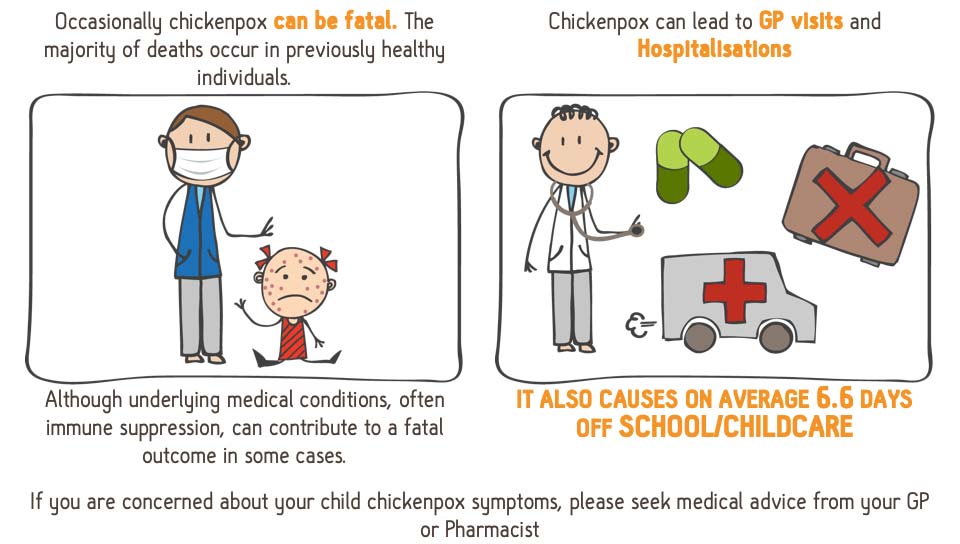Chickenpox vaccine
Home » Chickenpox vaccine
We provide vaccination for individuals from 9 months of age (children & adults) to protect them against chickenpox (varicella). In addition, vaccination within 3 days of exposure to someone with chickenpox may help prevent chickenpox or reduce the severity of disease.
Cost: £70 per dose inclusive (i.e. there is no consultation fees); the full course requires two doses.
This vaccine is used for immunisation against chickenpox AND Chickenpox vaccine may be given at the same time or at any time before or after other vaccines. However, if chickenpox and MMR vaccines are not administered on the same day, then a ONE-month minimum interval period should be observed. For more information see below under scheduling.
To book an in-clinic appointment call: 020 7435 7075
To arrange a home visit email your post code to: info@hhpharmacy.co.uk
Please bring records of any past vaccinations you have received and/or the personal child health record (Red Book) to your appointment.
Our telephone line is open Mon – Fri 9:00 to 18:30 & Saturday: 9:00 to 17:30.
- Vaccinations are done at our clinic in London OR at your home
- To book an appointment in our clinic, please call us on 020 7435 7075
- We are unable to book appointments for our vaccination clinic via email
- The minimum vaccination home visit fee is £80 per visit. To obtain a quotation for the home visit fee, please email the service required, your post code and mobile number to info@hhpharmacy.co.uk
Disease Issues
What is chickenpox?
Chickenpox is an acute disease, predominantly occurring in childhood.
It is caused by varicella-zoster virus and is characterised by a vesicular rash, and often fever and malaise.
Up to 90% of susceptible contacts (e.g. non immune household contacts) develop the disease.
How is chickenpox transmitted and for how long is an infected person contagious?
Transmission is by personal contact or droplet spread, with an incubation of 1–3 weeks (i.e. time from infection to symptoms appearing).
Chickenpox is infectious from 1–2 days before the rash appears until the vesicles are dry or have crusted over, usually about 5 days after the onset of the rash.
Year round transmission occurs with seasonal peaks spring/early summer.
How serious a disease is chickenpox?
Chickenpox is usually a self-limiting disease in healthy children.
Complications include:
- Bacterial skin infection, most common in young children.
- Lung involvement, more common in adults.
- In pregnancy, severe maternal chickenpox and fetal varicella syndrome. In later pregnancy, varicella can result in neonatal chickenpox infection.
- In immunocompromised people, severe disseminated chickenpox with varicella pneumonia, encephalitis, hepatitis, and haemorrhagic complications.
If serious complications (such as pneumonia, encephalitis, or dehydration) are suspected, admission to hospital should be arranged.
Severe chickenpox in an 11 months old child
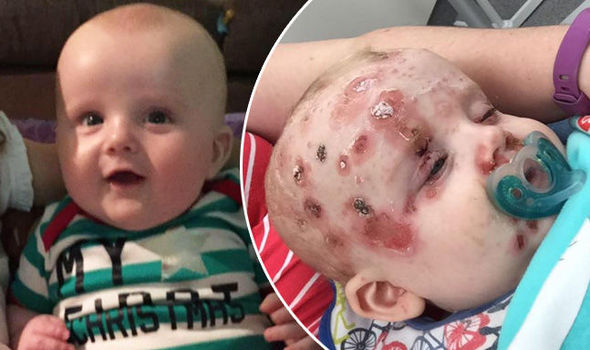
Chickenpox & Scarlet fever
Scarlet fever is caused by bacteria which are spread when the person’s mouth, throat, or nose comes into contact with infected saliva or mucus (which may be present on cups, utensils, and surfaces), or by aerosol transmission. Outbreaks in schools or other institutions sometimes occur. Scarlet fever most commonly affects children of school age, peaking at 4 years of age.
According to the guidance from Public Health England, chickenpox (varicella) is the most common risk factor for infections such scarlet fever and tonsillitis in children. In other words, those who have had chickenpox recently are more likely to develop a more serious infection during an outbreak of scarlet fever, therefore, parents should remain vigilant for symptoms, such as, persistent high fever, cellulitis – a skin infection – and arthritis.
The success of the U.S. chickenpox vaccination programme

If chickenpox is co-circulating with scarlet fever in a nursery or pre-school setting, chickenpox vaccination is recommended for children and staff with no clear history of chickenpox. Chickenpox vaccine administered within three days of exposure may be effective in preventing chickenpox.
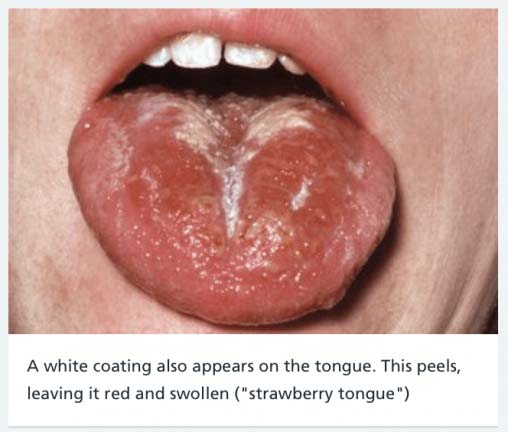
“Scarlet Fever: Strawberry tongue” – See www.nhs.uk/conditions/scarlet-fever/
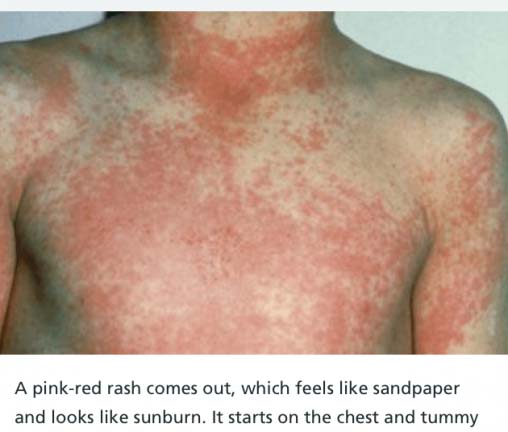
“Typical scarlet fever rash” – Children who have had chickenpox recently are more likely to develop more serious infection during an outbreak of scarlet fever and so parents should remain vigilant for symptoms such as a persistent high fever, cellulitis (skin infection) and arthritis (joint pain and swelling). If you are concerned, seek medical assistance immediately.
Chickenpox vaccine
How protective is the vaccine?
Chickenpox (Varicella) vaccine has been available for use since 1995.
The chickenpox vaccine gives about 98% protection in children and about 75% protection in teenagers and adults against chickenpox infection.
For those who are vaccinated but still get chickenpox, the symptoms will generally be milder.
Available information suggests that chickenpox immunisation may reduce the risk of developing shingles later in life in comparison with those who had wild-type disease.
How long does vaccine protection last?
Protection after two doses of vaccine appears to be very long for most people immunised, however, it is not known if it is lifelong at this stage. Countries that have been using the vaccine for a long time have not identified a need for booster doses.
What are the vaccine recommendations?
The UK government is now officially advised to start a chickenpox vaccination programme, but there is no fixed plan on when NHS starts routine chickenpox vaccinations. See details here.
Vaccination policies vary worldwide, chickenpox vaccine is NOT part of the NHS routine immunisation schedule, but it is in Finland, Germany, Greece, Italy, Latvia, Luxembourg, Spain, Australia, USA and Canada.
Those travelling for education/employment to the US or Canada maybe asked for proof of vaccination or immunity as the vaccine is used routinely in their national vaccination schedule. Further information on requirements is available from Centres for Disease Control and Prevention. Travellers Health – Yellow Book: Varicella (Chickenpox)![]()
The chickenpox vaccine is currently only offered on the NHS to people who are in close contact with someone who is particularly vulnerable to chickenpox or its complications.
Can the chickenpox vaccine be used in post-exposure settings? How soon after exposure does the vaccine need to be administered?
Chickenpox secondary attack rate among household contacts is more than 70% in unvaccinated people and 15% in those with one-dose of the vaccine. In addition, the disease is more severe in secondary cases than in index case, with more number of lesion, higher fever and risk of pneumonia.
The chickenpox vaccine is authorised in the UK to be used as post-exposure prophylaxis (PEP).
When used as PEP for the prevention of chickenpox within 3 days of exposure, it is around 80% effective at preventing chickenpox; when PEP is administered beyond 3 days, it is around 50% effective.
Even if the chickenpox is not prevented its severity is reduced. A second dose is also required to complete the course after around 6 weeks – see evidence here: https://www.ncbi.nlm.nih.gov/pmc/articles/PMC8903924/
Who is at risk of chickenpox?
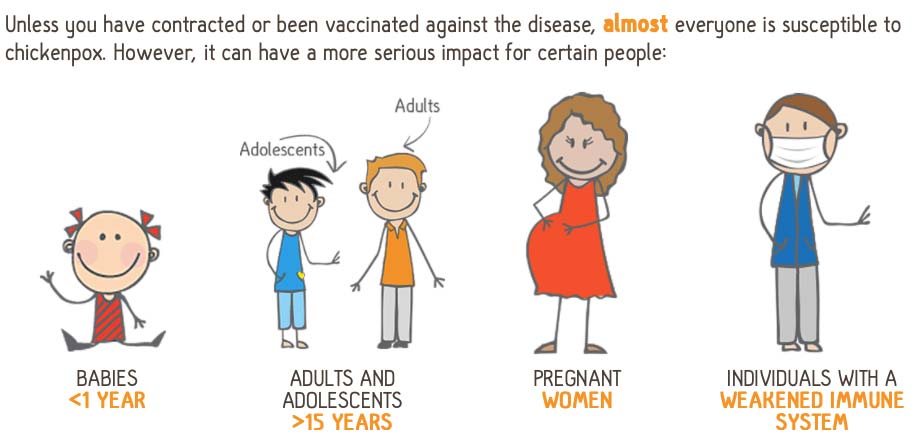
Complications of chickenpox
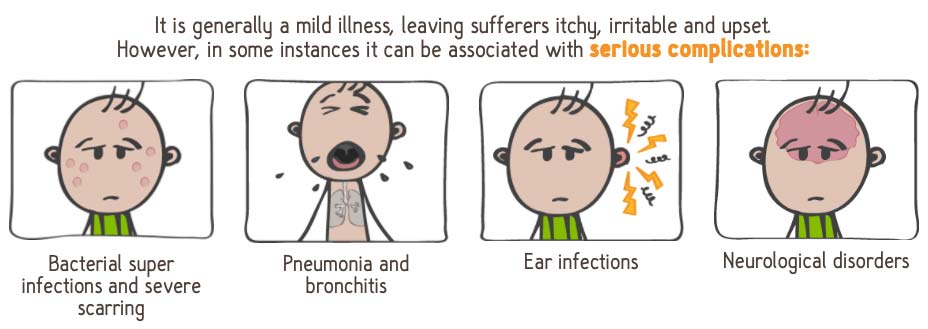
Why not let my child get chickenpox naturally and build natural immunity?
1) Chickenpox can be a mild disease, but it isn’t always. There’s no way to know who will have a mild case and who will become very sick. When your child gets his or her chickenpox vaccine, he or she is getting immunity from chickenpox without the risk of serious complications of the disease. Adults, pregnant women, neonates, and immunocompromised people are more susceptible to serious complications.
The predicted 651, 000 cases of chickenpox per year in England and Wales result in an estimated 384, 000 doctor visits, 2,200 hospitalisations, and 20 deaths (British Medical Journal, 2003).
2) Prevents your child from feeling itchy and uncomfortable from chickenpox
3) Keeps your child from missing school or childcare (and keeps you from missing work to care for your sick child).
4) The majority of UK born adult travellers will be immune, but those travelling with non immune children should be aware of the potential for infection to occur whilst overseas.
If a child has a very mild case of chickenpox (for example, only 5 to 10 pox), is s/he immune or should s/he be vaccinated?
A mild case of chickenpox produces immunity to chickenpox as does a moderate or severe case. A child with a reliable history of chickenpox does not need to receive chickenpox vaccine. However, if there is any doubt that the mild illness really was chickenpox, it is best to vaccinate the child. There is no harm in vaccinating a child who is already immune.
Scheduling
This vaccine can be given to both adults and childern from the age of 9 months (used to be from 12 months of age prior to Sep 2017).
Children 9 months up to and including 12 years
2 doses should be given to ensure optimal protection against varicella.
– Children from 9 to 12 months of age
The 2nd dose should be given after a minimum interval of 3 months.
– Children from 12 months to 12 years of age
The 2nd dose should be given after an interval of at least 6 weeks but in no circumstances less than 4 weeks.
This vaccine should not be administered to children aged less than 9 months.
Adolescents and adults from 13 years of age and above
2 doses. It is preferable to administer the second dose at least 6 weeks after the first dose but in no circumstances less than 4 weeks.
Chickenpox vaccine may be given at the same time or at any time before or after other vaccines. However, if chickenpox and MMR vaccines are not administered on the same day, then a ONE month minimum interval period should be observed.
This is based on a study in the US (Mullooley & Black, 2001) which showed a significant increase in breakthrough infections when varicella vaccine was administered within 30 days of MMR vaccine; suggesting that MMR vaccine caused an attenuation of the response to varicella vaccine. When the vaccines are given on the same day, however, the responses have been shown to be adequate (Plotkin, Orenstein & Offit, 2013.).
Where protection from either vaccine is required rapidly then the vaccines can be given at any interval and an additional dose of the vaccine given second should be considered.
Vaccine Safety
How safe is varicella vaccine?
Chickenpox vaccine contains live-weakened varicella-zoster virus. The vaccine has an excellent safety profile and is well tolerated.
About 20% of vaccine recipients will have minor injection site complaints, such as pain, swelling, or redness.
Fever following varicella vaccine is uncommon.
For more information see chickenpox vaccine’s package leaflet: Information for the user.
Pregnancy and breast-feeding
Women who are pregnant should NOT receive the chickenpox vaccine and pregnancy should be avoided for one month following the last dose.
Studies have shown that the vaccine virus is not transferred to the infant through breast milk and therefore breast-feeding women can be vaccinated if indicated.
Is there any concern when giving chickepox vaccine to a child who lives with a susceptible pregnant woman or an immunocompromised individual?
Chickenpox vaccination is recommended for healthy household contacts of pregnant women and immunosuppressed people. Although there may be a small risk of transmission of chickenpox vaccine virus to household contacts, the risk is much greater that the susceptible child will be infected with wild-type chickenpox, which could present a more serious threat to household contacts.
If a person develops a rash after receiving chickenpox vaccination, does he need to be isolated from susceptible people who are either pregnant or immunosuppressed?
Transmission of chickenpox vaccine virus is rare. However, if a pregnant or immunosuppressed household contact of a vaccinated person is known to be susceptible to chickenpox, and if the vaccinee develops a rash 7 to 21 days following vaccination, it is prudent that they avoid prolonged close contact with the susceptible person until the rash resolves.
